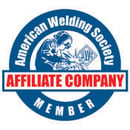Aerospace CNC Machining & Welding Services
The Capabilities of CNC Machining
 In the aerospace industry, machinery is used to assemble and maintain essential aircraft and space vehicle components, preventing imperfections that can lead to disastrous results in aerospace applications.
In the aerospace industry, machinery is used to assemble and maintain essential aircraft and space vehicle components, preventing imperfections that can lead to disastrous results in aerospace applications.
At Superior Joining Technologies, we specialize in turnkey, 5-axis CNC machining services for the aerospace industry who relies on CNC machining of aerospace parts to eliminate the risk associated with human error. The result is high-precision components that can be relied on.
Benefits of CNC Machining for Aerospace Industry
CNC machining has many advantages over manually controlled fabrication methods, where operators are needed to prompt and guide machining tools by levers, buttons, and wheels. These include:
- Consistent, repeatable results
- Manufacturing cost savings
- Increased efficiency
- Improved production speed
- Reduced downtime
- Heightened safety
- Superior surface finish
- Tolerances of +/-.0002”
- Complex surfaces machined in one pass
- Compound angle holes and undercuts cut quickly and accurately
- Any shape or form is possible
Components for Aerospace Applications:
- Electrical connectors
- Housings
- Castings
- Parts for oxygen generation
- Seats
- Filter bodies
Welding Services
Welding is a manufacturing process that joins materials, using metals or thermoplastics, by causing fusion, which is distinct from lower temperature metal-joining techniques such as brazing or soldering, which do not melt the base metal. In addition to melting the base metal, a filler material is typically added to the joint to form a pool of molten material that cools to form a joint that is usually stronger than the base material.
Aerospace applications require heightened weld quality and consistency to perform optimally. At Superior Joining Technologies, Inc., we are an AS9100 registered precision welding facility offering aerospace welding services at the level of expertise and documentation necessary in the aerospace industry. We offer experienced and highly skilled welders, flexibility, and dedication to quality.
- GTAW – Joins critical components while producing welds with the utmost quality and purity. Includes NADCAP Manual GTAW, Micro GTAW, and Longitudinal Seam GTAW.
- Nadcap Laser Beam Welding – Uses a precisely focused beam of light to fuse metal together. Used on hard-to-access areas and extremely small components. Includes Micro Laser Beam Welding, Laser Beam Welding with Powder Deposition, and Multi-Axis Laser Beam Welding.
- Resistance Welding – Joins metals by applying pressure and passing a current through the joined metal area. Includes Circumferential Seam Welding and Resistance Spot Welding.
Benefits of Welding in the Aerospace Industry
At Superior Joining Technologies, we have high standards for our welding and testing processes that eliminate weld defects that can impact aerospace components. Other benefits include:
- Reduced weight
- Reduced cost
- Improved performance
- Increased production speed
Superior Joining Technologies, Inc. is an AS9100, ISO9001, and Nadcap-accredited facility and service provider. Our welding processes are approved by Boeing, GE, Unison, Collins Aerospace, and Safran.
Welded Components For Aerospace Applications:
- Anti-backlash assemblies
- Bellows assemblies
- Check valve assemblies
- Gas bottle weld assemblies
- Linear actuators
- Mount plate assemblies
- Niobium targets
- Pyro valves
- Rocket nozzles
- Sensing assemblies
- Transducer housing
- Auxiliary inlet vane assemblies
- Bobbin housing assemblies
- Core and rod assemblies
- Gears and gear train assemblies
- Landing gear struts
- Motor brakes
- Phase shifters
- Regulator assemblies
- Satellite propellant valves
- Target holder assemblies
- Trigger assemblies
Materials for Welded Aerospace Components
Many aerospace applications have requirements to use many different alloys and exotic materials. These may include:
- Aluminum
- Carbon steel
- Inconel
- Stainless steel
- Titanium
- Monel
Aerospace NDT Inspection Services
Non-destructive testing (NDT) is a group of analysis techniques used to evaluate the properties of materials, components, or systems without causing damage. This evaluation method detects imperfections that may negatively impact equipment performance and longevity, as well as user health and safety. NDT is also used for the qualification of new materials and during the testing and certification process to test performance and durability. Superior Joining Technologies is a Nadcap-accredited leading provider of surface flaw detection assessments. We work to verify the reliability and safety of materials, products, and equipment with industry-leading surface inspection services.
- Visual inspection, also called VI or VT – Uses the naked eye to look over a piece of equipment for flaws. It is used for internal and external surface inspection.
- Liquid Penetrant inspection, or PT– Identifies surface discontinuities. It is ideal for use on non-porous materials. Liquid penetrant is pulled into cracks by capillary action. A developer is used to draw out penetrant from the crack and produce a surface indication. Our PT process includes sensitivity levels 2, 3, and 4.
- Magnetic Particle Inspection, MT– Detects surface and shallow subsurface discontinuities in materials such as iron, nickel, cobalt, and alloys. In this process, an electrical current is run through the component. Any crack or defects will interrupt the magnetic lines of flux and cause magnetism to spread out, which creates a flux-leakage field at the damage site. This field will draw metal particles that have been spread over the component to any flaws on or near the surface and create a visible indication of its approximate size and shape.
Our highly trained and knowledgeable NDT inspectors include two technicians who’ve earned Level III certifications in accordance with NAS410 (National Aerospace Standard) for MT and PT. A third technician is an ASNT-certified Level II in LPI. They provide complete traceability and documentation of product manufacturing to AS9100:2016, Rev. D, and ISO9001:2015 standards.
The Superior Joining Difference
Superior Joining Technologies, Inc is a woman-owned small business that works hard to provide high-quality products for our customers. We are a trusted provider of CNC machining, precision welding, additive manufacturing, laser marking and cutting, and NDT inspection services for the aerospace industry.






